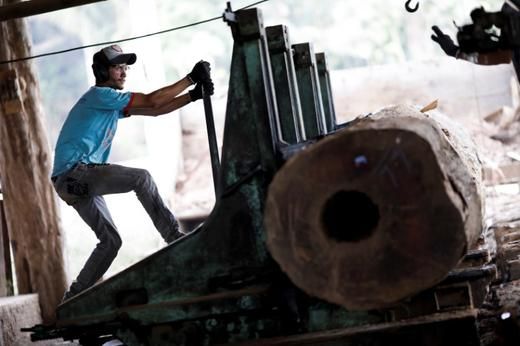
反對富豪瓜分世界.全球資源人民共享。People Before Profit!
Will Amazon Deforestation Create New Pandemic?
Author: Fabio Zuker Fabio Zuker
Source: Thomson Reuters Foundation
Date: October 15, 2020
Translation: Global Monitoring

As farms expand into the Amazon rainforest, felled trees and expanded pastures will allow Brazil to export not only beef and soybeans — but also potentially new diseases, the researchers noted.
Changes in the Amazon rainforest have driven different kinds of animals — bats, monkeys, mosquitoes — to new places and welcomed species more adapted to prairie life — including rodents.
Adalberto Luís Val, from the National Institute of Amazonian Research (INPA) in Manaus, said: "These shifts, along with more frequent changes as people move deeper into the forest, Human-animal contact increases the chances of a toxic virus, bacteria or fungus spreading between species.”
The biologist continued that climate change, in addition to causing rising temperatures and changing rainfall, is also exacerbating the crisis.
"There's a lot of concern about this because ... it represents species migration. In this scenario of facing new challenges, organisms adapt by migrating," Wahl said in an interview with the Thomson Reuters Foundation. Said in a telephone interview.
The Evandro Chagas Institute, a public health organization in Belém, has identified about 220 viruses from the Amazon and determined that 37 of them cause disease, Var said. , and 15 species have the potential to cause epidemics.
An article by Val, published in May by the Brazilian Academy of Sciences, noted that the viruses included a range of different variants of the encephalitis virus, West Nile virus, and Rocio, the Brazilian virus responsible for yellow fever. It belongs to the same family as the West Nile fever virus.
Wahl mentioned that he is particularly concerned about arboviruses, such as mosquito-borne dengue and Zika.
"Virus Spill"
Cecília Andreazzi is a researcher at the Oswaldo Cruz Foundation (FIOCRUZ), one of Brazil's leading public health research institutions. She points out that the current surge in deforestation and fires in the Amazon would lead to new contacts of migrating species -- which would create opportunities for existing pathogens to mutate or spread across species.
The ecologist mapped existing vectors in Brazilian animals and constructed a mathematical model that explains how changing environmental patterns affect the structure of these interactions.
She is looking for possible "virus spillovers" - when a pathogen originally deposited in one species begins to circulate in another species, it may create new diseases - the new coronavirus epidemic in China is example.
"Super-biodiverse countries, with fragile communities and high rates of environmental degradation, are prone to spillover of pathogens from wildlife to humans. Therefore, these countries need to develop policies to prevent the emergence of zoonotic diseases." Andre Aceh and The other researchers wrote in a letter published in the scientific journal The Lancet in September.
They say Brazil has seen "alarms" that clearly reflect the growing problem: Brazilian hemorrhagic virus, rodent-borne hantavirus, and a mosquito-borne arbovirus, Oropouche virus .
Several fires in Brazil this year were the worst in nearly a decade. At the same time, deforestation and the encroachment of Aboriginal lands have also increased, as right-wing President Jair Bolsonaro has declared that developing the Amazon is the way to eradicate poverty.
Speaking before the UN General Assembly last month, the president angrily denied fires in the Amazon rainforest, calling the claim a "lie" - even figures produced by the Brazilian government show thousands of cases in the Amazon. fire.
'Put the blame on the bat'
João Paulo Lima Barreto, an indigenous from the Tukano tribe, says updating old knowledge about the relationship between living things is also a fight against the threat posed by new epidemics a method.
Barreto's doctoral research at the Federal University of Amazonas was on shamanic knowledge and medicine. He founded Bahserikowi'i, an aboriginal medical center, which brought shamanic knowledge from the upper Rio Negro to Manaus, the largest city in the Amazon.
He called for a serious view of Aboriginal knowledge systems.
"The pattern of our relationship with our environment right now is not right," he said in a telephone interview with the Tom Deep Reuters Foundation.
"It's easy to blame bats, monkeys or pigs," Barreto said of the emergence of new diseases. "But the truth is, humans have created the status quo based on the relationships we have established with the owners of this space."
Barreto continued that the lack of adequate protection of forests, rivers and animals can lead to ecological imbalances and disease, due to human failure to respect the natural entities - collectively referred to by shamans as Wai-mahsã. , which means "invisible human being".
Some particularly strong disease risks stem from transforming the Amazon rainforest into more open, savannah-like fields that attract marsupials and rodents, both carriers of hantavirus, Andrea Aczi noted. By.
"To turn the Amazon into a field is to create a comfort zone." And these species may expand their sphere of influence to fill it, she said.
In the face of deforestation, the animal is "migrating and moving while the pathogenic virus seeks its host"—a situation that creates a "high adaptive capacity" for the latter, she continued.
But Andre Aceh is equally concerned about old and new diseases.
Changes in Amazonia, she said, have re-emerged old diseases such as malaria, Leishmaniasis and Chagas disease, the latter of which is transmitted by "kissing bugs" that can cause heart problems. damage.
"We don't even need to talk about new diseases, because the old ones are enough to bring about a huge crisis," Andre Aceh added.
--
Pay attention to the content released by Global Monitoring on WeChat public account:

Like my work?
Don't forget to support or like, so I know you are with me..
Comment…